It will be interesting to see whether India-China border tensions figure during the deliberations of PLA deputies to China's National People's Congress, notes Jayadeva Ranade, the distinguished China expert and retired RA&W officer.
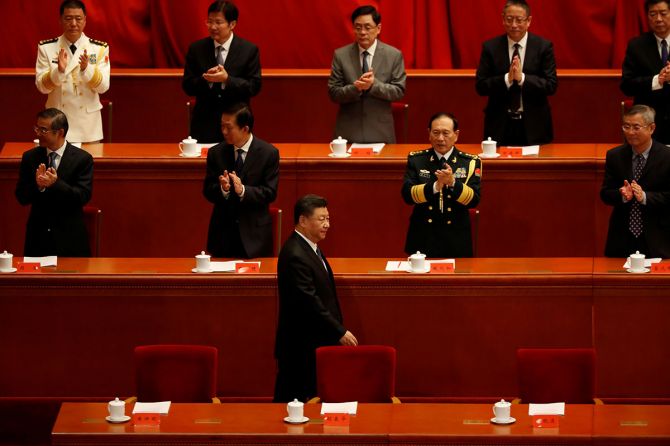
China's 'Big Two', as the plenary sessions of China's version of a parliament, the National People's Congress (NPC) and top political advisory body, the Chinese People's Political Consultative Conference (CPPCC) are called, is due to open in Beijing on March 5 and 4 respectively.
The deliberations at the NPC and CPPCC sessions will reveal China's priorities for this year and the longer term.
The reports are expected to bear the unmistakable imprimatur of Xi Jinping.
Stringent security measures blanketing Beijing have been in place for the past few weeks in accordance with past practice.
Precautions have now been heightened because of the explosion in a restaurant, which killed almost half a dozen people, on February 26 just yards from Zhongnanhai -- the walled compound at the heart of Beijing where China's top leadership resides.
The steady build-up of Xi Jinping's personality cult witnessed a spurt in the run up to the annual plenary sessions, possibly to influence the Ddeputies.
While China's official media coverage of Xi Jinping today surpasses even that of Mao Zedong, an example was the article in the Chinese Communist party's official newspaper People's Daily on February 24.
Spread over three entire pages, including the front page, it credited Xi alone for the poverty alleviation campaign.
The article mentioned Xi 139 times and omitted all reference to his predecessors including Mao and Deng Xiaoping!
Ideological campaigns to fortify China with communism and reinforce the commitment of Party members were also launched.
In February alone two campaigns were launched.
One was to 'study the development of Party history learning and education' which was kicked-off on February 20.
Two new books on party history compiled by the CCP were also released nationwide on February 24 and 26.
Earlier on February 4, the People's Daily signalled the start of a campaign to energise the Chinese Communist party's 130 million-strong Young Pioneers.
It front-paged an editorial that called the Young Pioneers a school for children to learn socialism and communism with Chinese characteristics" and "a reserve team for building socialism and communism'.
The editorial included six references to 'Xi Jinping' and 'Xi Jinping Thought', but mentioned none of China's other leaders including Mao Zedong or Deng Xiaoping!
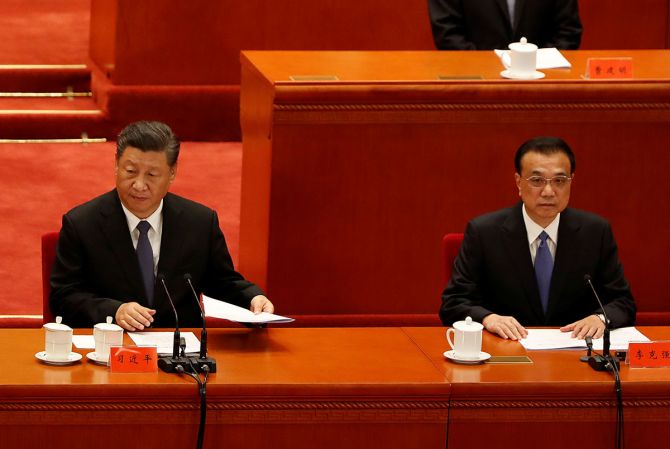
The centrepiece of the NPC and CPPCC sessions will be the Report on the Work of the Government to be presented by Chinese Premier Li Keqiang.
It will detail China's achievements over the past year despite the deleterious economic effects of the COVID-19 pandemic.
The economy will be a focus. Some CPPCC Delegates were quoted by Asia Times (February 24) as saying that Li Keqiang would set a 'soft' GDP growth target of around 4%-5% for the year.
The Work Report will probably identify, among others, the need to promote agriculture and increase food-grain production; decline in China's working-age population; and the crucial technology sector, which after former US president Trump targeted China's 'Made in China' programme has been set back by at least 5 years.
Professor Wong Kam-fai, a CPPCC delegate and deputy dean of the Chinese University of Hong Kong's department of systems engineering and engineering management, says China's chip and integrated circuit sector would need 8 to 10 years to catch-up with Western competitors.
He anticipated that China could create a major chipmaker by mid-2035.
Agriculture is a sensitive issue for China's leadership, which apprehends a global food grain shortage within the next 10 years.
This concern is reflected by the issue for the 18th consecutive year by the Community party's Central Committee of Central Document No: 1 on Agriculture -- the first Document of 2021.
The State-owned CGTN explained that rural income growth is expected to outpace urban income growth and that construction of rural infrastructure facilities will be basically completed by 2025.
The steady decline in China's population despite the full removal of birth restrictions on the population in 2015 is another area of concern.
Official statistics reveal that there was a 15% decline in the birth rate in 2020 which plunged to 6.6 per 1,000 people in 2019, the lowest level in 14 years.
China's ministry of civil affairs also anticipates that China's State pension scheme could run out of funding by 2035 because of the rising number of elderly residents aged 60 or above, who in 2019 account for 18% of the whole population.
Technology is an important area of endeavour for China's leaders and will feature prominently in Li Keqiang's Work Report.
The Central Economic Work Conference convened at the end of last year had prioritised that strengthening the national strategic scientific and technological capabilities is the first key task of this year.
The State-owned CCTV News disclosed on February 14, that that during his inspections on the eve of the Spring Festival over the years, Xi Jinping has visited scientific and technological workers many times and that 'General Secretary Xi Jinping is very concerned about technological innovation'.
Xinhua separately observed that Xi Jinping or Li Keqiang may attend the panel discussions of NPC and CPPCC deputies from the nation's research institutes as well as private tech companies to seek policy recommendations.
Linked with this is the report in the Beijing-based Economic Observer newspaper, which said sectors like chips, jet engines, next-generation telecommunication solutions and vaccines and drugs against infectious diseases, would receive considerable funding.
Civil-Military Fusion will gain prominence with Huawei, under the auspices of China's ministry of industry and information technology, having initiated the pooling of scientific human resources of Peking University, Tsinghua University, the People's Liberation Army's National University of Defense Technology as well as 90 Chinese chip designers and foundries for establishing a National Integrated Circuit Standardization Committee.
Politburo Standing Committee member and NPC Chairman Li Zhanshu, has reportedly instructed the NPC secretariat to draft legislative proposals based on their recommendations.
It will be interesting to see whether the India-China border tensions figure during the deliberations of PLA Ddeputies to the NPC and CPPCC.
Finally, approval by the NPC of the Long-Term Goals for 2035 will implicitly endorse confidence in Xi Jinping's leadership.
Jayadeva Ranade, former Additional Secretary, Cabinet Secretariat, Government of India, is the President, Centre for China Analysis and Strategy.
Feature Presentation: Aslam Hunani/Rediff.com
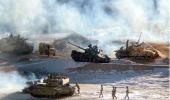
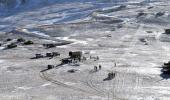


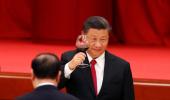




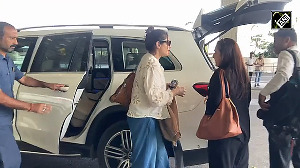

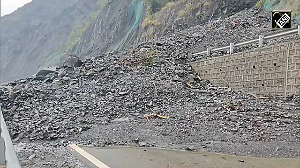
 © 2025
© 2025